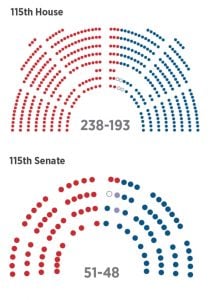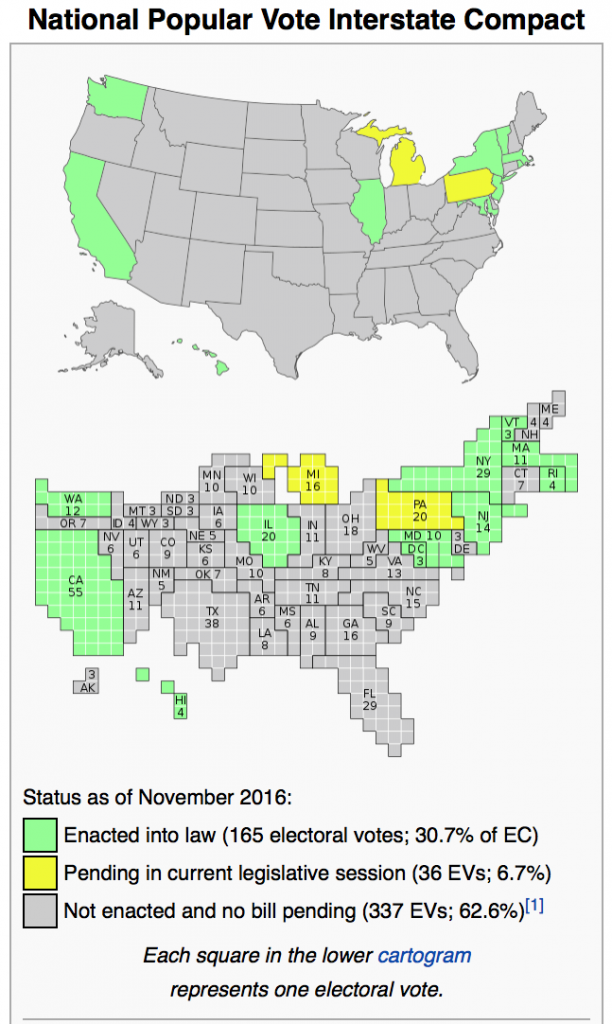
In the aftermath of the November presidential election, Towleroad is exploring several legal issues related to the result, the incoming administration, and the future of democracy in America. If you have any questions, please email law@towleroad.com.
The Electoral College was created to protect slavery. Over the years, it has come to over-represent small, low-population states, which has the effect of diluting the voting power of urban residents, including persons of color and other marginalized groups. And, in the last 20 years, it has elevated two presidents who lost the popular vote. Given the Electoral College's history, its effect, and its threat to democracy, shouldn't we get rid of it?
Transitioning to the direct election of the president will be difficult. We could also work around it.

The Electoral College might be undemocratic, but it is enshrined in the Constitution. As such, eliminating it would require a constitutional amendment. Article V outlines two ways to do that: “The Congress, whenever two thirds of both Houses shall deem it necessary, shall propose Amendments to this Constitution, or, on the Application of the Legislatures of two thirds of the several States, shall call a Convention for proposing Amendments, which, in either Case, shall be valid to all Intents and Purposes, as part of this Constitution, when ratified by the Legislatures of three fourths of the several States, or by Conventions in three fourths thereof, as the one or the other Mode of Ratification may be proposed by the Congress.”
We've actually never used the state convention process. So, we would need 2/3 of the House and Senate to agree and 3/4 of the States. In the incoming House and Senate, Democrats don't even control a majority, let alone a 2/3 majority. I cannot foresee a future where Republicans in the House and Senate, whose party has won the presidency twice in recent history while losing the popular vote, would vote against their interests.
If we can't get rid of the Electoral College, we could try to get around it. But it is not entirely clear that will happen, either.
The Constitution empowers the legislatures of the States to decide how they will assign Electors. Several states have already passed legislation to automatically give their Electoral College votes to the winner of the popular vote, regardless of how the residents of those states vote. The program is called the National Popular Vote Interstate Compact (NPVIC). The NPVIC would only take effect after enough states with Electoral Votes adding up to 270 have signed on. As of today, the NPVIC has 165 votes, but with big Republican states like Texas likely unlikely to pass such legislation, the NPVIC will need some combination of swing state-Democratic leaning states to join. Michigan and Minnesota are a must, and so would some mixture of Ohio, New Hampshire, Colorado, Florida, Virginia, Nevada, Iowa, Wisconsin, and Pennsylvania. Meanwhile, Connecticut and Delaware, reliable Democratic states, have not even signed on.
 There are three significant barriers to the NPVIC. First, some Democrats think the Electoral College can still be a Blue firewall against Republicans. The 2016 election notwithstanding, states like Pennsylvania and Michigan and Wisconsin have still often voted Democratic in presidential elections. A small swing in those states would have given Hillary Clinton the presidency. Second, legislation passed could be repealed. A group of states could pass the NPVIC and campaigns could start reorienting themselves to a popular vote model. But political changes at the state level could inspire legislatures to make last minute changes if they felt the elections were not going their way. This uncertainty could undermine the entire project.
There are three significant barriers to the NPVIC. First, some Democrats think the Electoral College can still be a Blue firewall against Republicans. The 2016 election notwithstanding, states like Pennsylvania and Michigan and Wisconsin have still often voted Democratic in presidential elections. A small swing in those states would have given Hillary Clinton the presidency. Second, legislation passed could be repealed. A group of states could pass the NPVIC and campaigns could start reorienting themselves to a popular vote model. But political changes at the state level could inspire legislatures to make last minute changes if they felt the elections were not going their way. This uncertainty could undermine the entire project.
Most importantly, the gerrymandering of state and federal districts toward Republican majorities makes NPVIC unlikely. Despite the generally Democratic tilt of many swing states in presidential years (again, this year notwithstanding), many of the legislatures and governorships in those states are dominated by Republicans who, over the last 4 to 8 years, have reconfigured voting districts to dilute Democratic votes and secure Republican majorities. Since Republicans have recently been the primary benefactors of the Electoral College, it is unlikely they would pass legislation to activate the NPVIC.
All of this suggests that getting rid or eroding the power of the Electoral College is unlikely. Then again, we could just hope that the electors decide to vote their consciences. There's a name for those people; we call them “faithless electors,” or those that defy the wishes of their state legislatures and, perhaps, state voters, and vote for someone other than the winner of the vote in their states. As much as I would like to trust that electors will recognize that Trump represents an existential threat to American democracy, we cannot rest the future of our nation on that hope.
So, for now, we are stuck with the Electoral College. This means that we need a legal and political strategy to advance a progressive agenda and defeat demagoguery, white nationalism and neo-Nazis, and hatred in a political system with the Electoral College.



